Related Research Articles
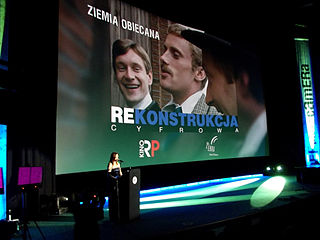
The history of cinema in Poland is almost as long as the history of cinematography, and it has universally recognized achievements, even though Polish films tend to be less commercially available than films from several other European nations.
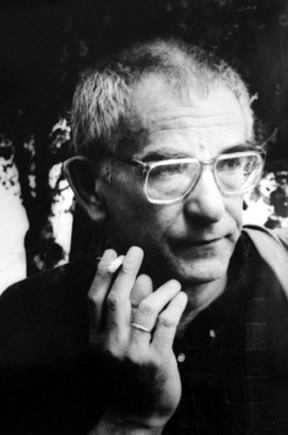
Krzysztof Kieślowski was a Polish film director and screenwriter. He is known internationally for Dekalog (1989), The Double Life of Veronique (1991), and the Three Colours trilogy (1993 –1994). Kieślowski received numerous awards during his career, including the Cannes Film Festival Jury Prize (1988), FIPRESCI Prize, and Prize of the Ecumenical Jury (1991); the Venice Film Festival FIPRESCI Prize (1989), Golden Lion (1993), and OCIC Award (1993); and the Berlin International Film Festival Silver Bear (1994). In 1995, he received Academy Award nominations for Best Director and Best Original Screenplay.
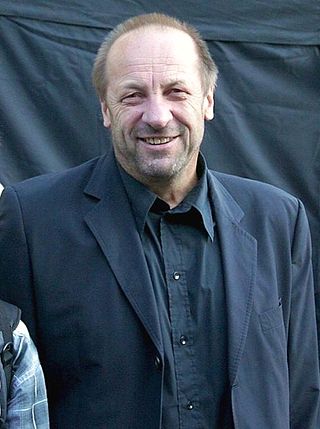
Zbigniew Preisner is a Polish film score composer, best known for his work with film director Krzysztof Kieślowski. He is the recipient of the Gold Medal for Merit to Culture – Gloria Artis as well as the Knight's Cross of the Order of Polonia Restituta. He is a member of the French Film Academy.
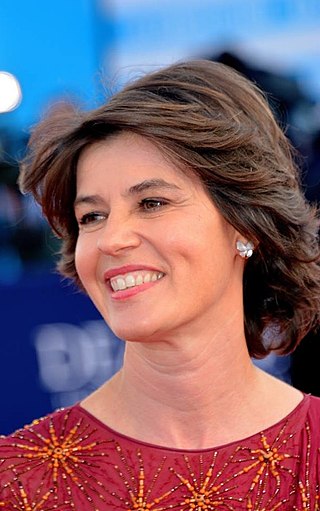
Irène Marie Jacob is a French-Swiss actress known for her work with Polish film director Krzysztof Kieślowski. She won the 1991 Cannes Film Festival Award for Best Actress for the Kieślowski film The Double Life of Veronique, and was nominated for the BAFTA Award for Best Actress in a Leading Role for her 1994 film Three Colours: Red. Her other film appearances include The Secret Garden (1993), Beyond the Clouds (1995), U.S. Marshals (1998), and Eternity (2016).

Krzysztof Marek Piesiewicz is a Polish lawyer, screenwriter, and politician. From 1991 to 1993 and from 1997 to 2011 he was a member of Polish Senate. He was the head of the Social Movement (RS) or Social Movement Party.
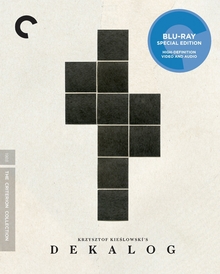
Dekalog is a 1989 Polish drama television miniseries directed by Krzysztof Kieślowski and co-written by Kieślowski with Krzysztof Piesiewicz, with music by Zbigniew Preisner. It consists of ten one-hour films, inspired by the decalogue of the Ten Commandments. Each short film explores characters facing one or several moral or ethical dilemmas as they live in an austere housing project in 1980s Poland.
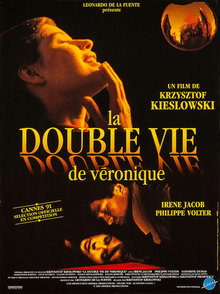
The Double Life of Veronique is a 1991 drama film directed by Krzysztof Kieślowski and starring Irène Jacob. Written by Kieślowski and Krzysztof Piesiewicz, the film explores the themes of identity, love, and human intuition through the characters of Weronika, a Polish choir soprano, and her double, Véronique, a French music teacher. Despite not knowing each other, the two women share a mysterious and emotional bond that transcends language and geography.

A Short Film About Love is a 1988 Polish romantic drama film directed by Krzysztof Kieślowski, starring Grażyna Szapołowska and Olaf Lubaszenko. Written by Kieślowski and Krzysztof Piesiewicz, the film is about a young post office worker deeply in love with a promiscuous older woman who lives in an adjacent apartment building. The film is set in Warsaw.

Polish Film Award, or Eagle is the national film award of Poland. It has been delivered annually since 1999, with the first event held on 21 June, by the National Chamber of Audiovisual Producers (KIPA). Since 2003 they have been awarded by the Polish Film Academy.
The 2005 Polish Film Awards ran on March 5, 2005. It was the 7th edition of Polish Film Awards: Eagles.
L for Love is a Polish soap opera, revolving around the multiple generations of the Mostowiak family. The series premiered on 4 November 2000 on TVP2, primarily as a weekly drama, and after one season shifted into a new timeslot and extended to two episodes per week. For the last few years the show has been the most watched drama on Polish television. Its popularity led to a Russian adaptation, entitled Lyubov kak Lyubov.

A Very Christmas Story is a 2000 Polish comedy film written and directed by Dariusz Zawiślak.

Kinga Anna Preis is a Polish film and theatre actress.
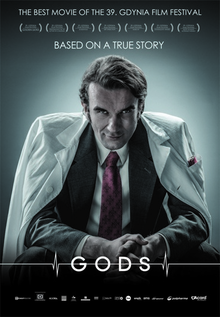
Gods is a 2014 Polish biographical feature film directed by Łukasz Palkowski. It is based on the life and career of Polish cardiac surgeon Zbigniew Religa, who performed the first successful heart transplant in Poland in 1987. The movie received the Golden Lions award for best film at the 39th Gdynia Film Festival (2014) and the Eagle at the Polish Film Awards (2015). Production of the film took place in autumn 2013.
The Polish Film Academy is a professional honorary organization dedicated to the advancement of the arts and sciences of motion pictures.

The Zbigniew Cybulski Award is a Polish annual film award given to best young Polish actors. It was established in 1969 on the initiative of Wiesława Czapińska and named to commemorate Zbigniew Cybulski who is widely considered one of the greatest Polish actors of the second half of the 20th century. It is among the most prominent awards in Polish cinema and the past winners include some of the most popular and critically acclaimed Polish actors. It was continuously awarded by the film magazine Ekran from 1969 to 1995 and after a ten-year hiatus it was reactivated in 2005 by the Kino Foundation. In 2008, the foundation published a book Być jak Cybulski?, which is devoted to all the past recipients of the award.

The Krzysztof Kieślowski Film School is a Polish film and television school established in 1978 and based in Katowice, Poland. It is a full-time film school and offers MA courses in Directing, Cinematography and Photography, Film and Television Producing. Kieślowski Film School is allowed to award PhD degree. One of its first tutors was Krzysztof Kieślowski. It is a part of University of Silesia.

Magdalena Piekorz is a Polish film director, screenwriter as well as film and theatre actress.

Bartosz Opania is a Polish film, television and theatre actor.
Marek Haltof is a professor (dr.hab.) of film studies. specializing in the cultural histories of Polish and Australian film.
References
- 1 2 3 "Cisza awards". IMDb . Retrieved 2015-05-24.
- ↑ Coates, P. (2005). The Red and the White: The Cinema of People's Poland. Wallflower Press. p. 112. ISBN 9781904764267.
- 1 2 Agustí, J.; Haltof, M.; Antón, M. (2013). The Cinema of Krzysztof Kieslowski: Variations on Destiny and Chance. Columbia University Press. p. 152. ISBN 9780231504027.
- 1 2 3 4 5 6 Woodward, S. After Kieślowski. pp. 24–26.